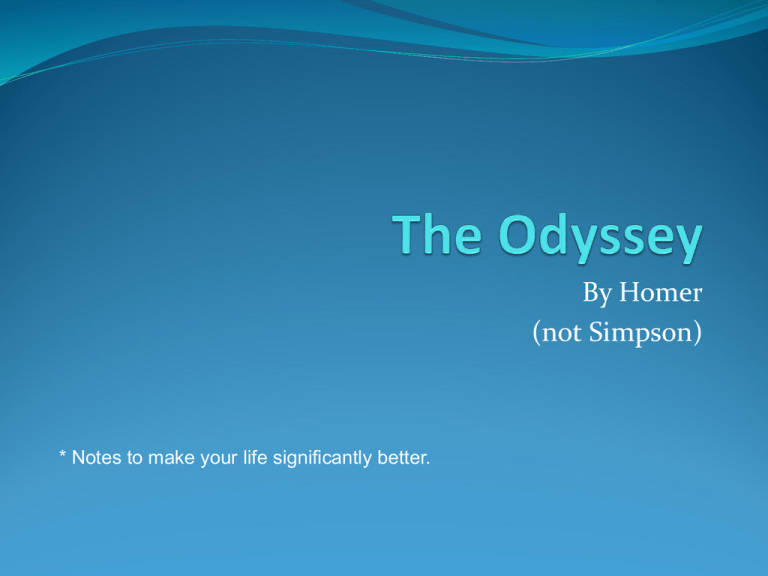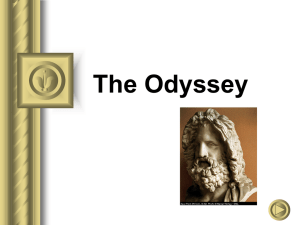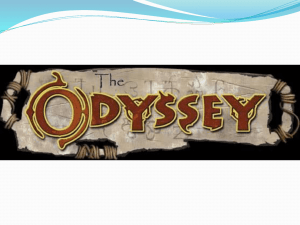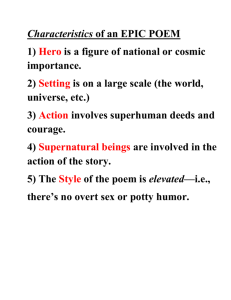The Odyssey
advertisement

By Homer (not Simpson) * Notes to make your life significantly better. Background The Odyssey is a sequel (the ________book in a series). It is the second of Homer’s two great __________. Part one is called _______________. An Ancient _____ poet The “_____” who composed the Iliad and the Odyssey between ___ and ___ B.C. Homer did not compose each epic all at once: he told them ___________________ that could be recited in an evening. _______, not Homer himself, organized the epics in __ books. The Iliad The Iliad is the story of ______________which might actually have taken place around _______B.C. This poem is a tale of myth and magic, not_______. The gods and goddesses of ______________ are important characters. They take sides in the war and _____________________________characters. According to the myth, the war started this way: _____ was a prince in the city of Troy. ______ goddesses asked him to judge who among them was the most________. Aphrodite, the___________, offered Paris a reward if he chose__________. She said he could have_____, the most beautiful woman in the world. However, Helen was married to__________, the King of______, a city in Greece. When Paris visited Sparta, Aphrodite made Helen fall in love with ______. Helen ran away with________. _________and his brother,_____________, led a Greek army against Troy to bring her back. The war that followed is called the Trojan War after the name______. The Iliad takes place during ____________ of the Trojan War. Its hero is __________, a mighty Greek warrior. The Iliad ends with the funeral of _______, a Trojan hero who is killed by Achilles. The story tells of many _________on both sides. One of the Greek heroes is named__________. The Odyssey The Odyssey is named for____________. Odysseus is the King of _______, an island off the coast of Greece. According to the myth, Odysseus did not want to _______ at Troy. He did not want to leave his wife, _________, and his baby son, _________________. Odysseus had to be _______ into joining the Greek army. Once he was involved in the fighting, however, he proved to be ________________. In fact, Odysseus thought of the trick that finally ________________________________ for the Greeks. The Odyssey is mostly about Odysseus’ adventures _______ the Trojan War. In one adventure he makes an enemy of ____________, the Sea God. Poseidon punishes him by ______________________ __________________________, never allowing him to reach home. Invocation to the Muse An INVOCATION is a___________________________. In ancient times, poets or artists would call upon a MUSE to help them __________________________. A MUSE is a person or thing that inspires you to create. Ancient poets, like Homer, would start their poems with an ______________________, or a call to help them create a great poem. Epic Poem or Story An Epic Poem or story is a ______________________ _______________________________________or a long journey. Characteristics of an epic The setting is ________________________________the world or the universe. The action consists of __________________________or requiring superhuman courage. Supernatural forces—gods, angels, demons — interest themselves in_________________________________. Characteristics of the Epic Hero EPIC HERO - a larger-than-life hero who embodies the values___________________________________________. Characteristics: 1. An epic hero is________________. He is braver, stronger, smarter, and cleverer than an ordinary person is. 2. The epic hero is on a ___________________________ ______________________to him or his people. 3. The villains that try to keep the hero from his quest are usually uglier, more evil, and more cunning than ________________________________in ordinary life. 4. The epic hero is often of _______________________and so possesses human weaknesses. 5. The ______________________________(the gods) interferes with the human world. Epithet _______________________________________________ _______________. Often seen in Homer’s Epic Poems. Epithets describe_________________, lineage, or personality traits. Example: Odysseus, son of Laertes Sparkling-eyed Athena Terms used to talk about Epics Poet opens by stating the_______, invokes the Muse, and opens the narrative__________________________, giving necessary exposition later. Poet includes catalogs of_________________________. Extended formal speeches by the main characters. Poet makes frequent use of___________________. Epic simile: an elaborate comparison, involved and ornate. Also called the _________________________ simile. The Greek Virtues All ___________were challenged to live by the virtues set by their culture. Breaking one of the Greek virtues meant_________________. The virtues are: Loyalty ____________________ Respect for the gods and goddesses Respect for _______________________________ Courage Themes ______________________________________________________________ Respect for the gods is shown through the numerous descriptions of sacrifices and offerings. Disrespect for the Gods inevitably leads to disaster; the Gods do not forget disrespect and are not easily appeased. (Poseidon, Athena, Helios.) The Importance of __________________________ Almost every time we met someone significant the narration pauses and we learn of the lineage. Many "things" we see also have a lineage or history that we are given - note Odysseus___________________________. Fate Fate is preordained by a power beyond that of even the gods. Paradoxically, it does not seem "random." A character's fate is tied up with his “________________________“.



